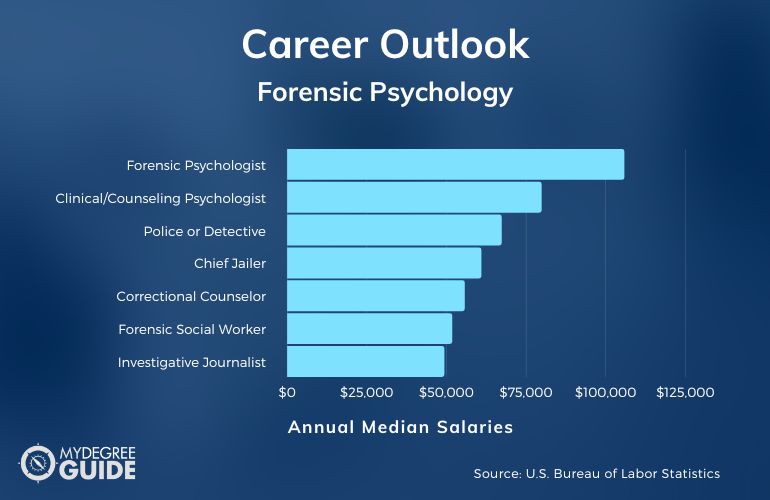Forensic psychology is a fascinating field that studies the relationship between criminality, law, and psychology, but what does a forensic psychologist do?

With a forensic psychology degree, you may be qualified for a number of rewarding positions that allow you to work with adult offenders, young offenders, and individuals accused of committing a crime.
Editorial Listing ShortCode:
The profession of forensic psychology may also qualify you to work closely with victims, children, attorneys, and professionals in the court system.
What Does a Forensic Psychologist Do?

This question is similar to the question of what criminal psychologists do. Forensic psychologists contribute to a breadth of research and knowledge in various areas of the field. For instance, they may contribute research regarding criminal behavior, specifically related to psychology and criminal thinking or decision-making.
They may also develop theories surrounding crime prevention and how to reduce the commission of criminal acts and recidivism rates. Forensic psychologists may also provide key insights into specific offenders or those accused of committing a crime. This information can aid defense attorneys or prosecutors in arguing their cases in the criminal justice system.
Forensic psychologists may support the justice system by consulting on criminal trials or civil court cases. They may provide valuable understanding in insurance claim, child custody, and child abuse cases. Depending on their scope of work, a forensic psychologist may support adult or young offenders in the justice systems.
Editorial Listing ShortCode:
There are a number of industries that can use the expertise of a forensic psychologist. These include government institutions, insurance, legal firms, healthcare, prisons and detention centers, academia, and research institutions.
Becoming a trained and licensed forensic psychologist may allow you to act in a number of positions. Some possible roles include counselor, teacher, researcher, expert witness, criminal profiler, and forensic counselor. You may also find positions as a forensic child psychologist, correctional treatment specialist, or social and community service manager.
5 Things You Can Do as a Forensic Psychologist

With training and expertise in the field of forensic psychology, there are several forensic psychologist careers available to you. These careers range from postsecondary teaching to working directly with offenders.
You may also have the opportunity to work within the court system as a jury consultant or advise participants in criminal trials.
1. Researcher
Forensic research psychologists contribute to the breadth of knowledge available within the field by conducting experiments and performing qualitative and quantitative research studies on human behavior.
Research may include evaluating the efficacy of eyewitness testimony, interviewing offenders to develop an understanding of their state of mind, or reviewing the effectiveness of police investigation tactics.
2. Teacher or Professor

Most forensic psychologists may be qualified to obtain teaching positions within postsecondary institutions. They may contribute to the development of course curriculum and the assessment of forensic psychology students.
They may also teach subjects in the field to aspiring forensic psychologists. In some cases, depending on employer expectations, forensic psychology professors may also be required to perform or conduct research in addition to their regular teaching duties.
3. Victim Counselor
Some forensic psychologists work directly with victims of criminal acts to help them process their experiences and develop effective coping mechanisms. In some cases, they may help victims better understand their legal rights following the crime.
This work may be performed as an independent counselor or for government and nonprofit organizations, including crisis centers.
4. Correctional Counselor

In the position of correctional counselor, a forensic psychologist may offer one-on-one or group counseling to offenders. This work may include supporting individuals within a detention center or those who have been recently released and are integrating back into normal society.
Correctional counselors can provide support in an attempt to reduce risks of reoffending. They may also perform assessments of an offender’s mental health issues to provide insight to parole boards, parole officers, and correctional officers, and other officials in the criminal justice system.
5. Jury Consultant
As a jury consultant, a forensic psychologist may provide support in the selection of jury members for trial. They may evaluate the reactions and body language of jury members during proceedings.
Editorial Listing ShortCode:
Jury consultants may also evaluate the effectiveness of specific eyewitness testimonies. They can provide attorneys with advice on how to approach their role in the court based on the makeup of a particular jury.
Forensic Psychology Careers & Salaries

According to the Bureau of Labor Statistics, there are a number of rewarding positions available to forensic psychologists with state licensure.
| Careers | Annual Median Salary |
| Forensic Psychologist | $105,780 |
| Clinical or Counseling Psychologist | $79,820 |
| Police or Detective | $67,290 |
| Chief Jailer | $60,910 |
| Correctional Counselor | $55,690 |
| Forensic Social Worker | $51,760 |
| Investigative Journalist | $49,300 |
| Mental Health or Substance Abuse Social Worker | $48,720 |
| Substance Abuse, Behavioral Disorder, or Mental Health Counselor | $47,660 |
| Rehabilitation Counselor | $37,530 |
As a profession, the field of psychology is predicted to grow by 3% over the next several years. Social worker positions are also expected to see growth, with a significant increase of 10% in the next ten years.
What Is a Forensic Psychologist?

Some students may wonder what a forensic psychologist is. Most forensic psychologists develop expert knowledge in relation to crime, law, and human behavior and use that expertise to support various areas of the justice system.
They are required to hold a state license to practice and have generally completed bachelors, masters, and doctoral degree programs. To attain this level of education, some students prefer on campus classes, but a growing number of universities offer bachelors, masters, and PhD in Forensic Psychology online programs.
They may act in positions such as researcher, professor, correctional counselor, jury consultant, victim advocate, child victim counselor, or expert witness.
What Is the Role of a Forensic Psychologist?
The role of a forensic psychologist can vary depending on the specific position or industry they are working within. For example, the role of a forensic research psychologist will differ greatly from a forensic psychologist acting as a jury consultant.
Some responsibilities may include providing counseling treatment to victims of crime or offering expert witness testimony during a child custody court case.
Editorial Listing ShortCode:
They may also interview convicted offenders to understand their state of mind and assess their risk of reoffending. Forensic psychologists may also perform evaluations of accused individuals to determine their fitness to stand trial.
Where Does a Forensic Psychologist Work?
A forensic psychologist may work in a diverse number of locations, including universities, research centers, jails, prisons, and youth detention centers. They may also work in private counseling offices, hospitals or medical centers, law offices, or government institutions.
Notably, those who work in government and hospital settings tend to make more on average than those operating in ambulatory healthcare services settings. Psychologists in these industries earn average salaries of $100,360, $90,640, and $85,970, respectively (Bureau of Labor Statistics).
Professors working in a postsecondary school or university earn an average of $78,180 per year.
How Much Does a Forensic Psychologist Make?

According to the Bureau of Labor Statistics, psychologists on average earn $82,180 per year, though the range of salaries can vary drastically. Top earners bring in over $137,590, and those on the lower end of the spectrum make closer to $46,270.
Forensic psychologists who choose to pursue careers in teaching and academia may make $105,780 on average, with salaries spanning from $44,500 to over $133,470 per year.
There are also other occupations you may qualify for with advanced education in forensic psychology. These include top executive roles in professional, scientific, and technical service settings ($208,000) and in healthcare and social assistance settings ($160,950). You may also pursue a career as a social scientist ($87,260) or survey researcher ($59,870).
What Skills Do You Need to Be a Forensic Psychologist?

As a forensic psychologist, the ability to remain objective and compassionate towards individuals who have committed crimes could be a valuable skill to have.
Having effective and strong verbal communication skills is also valuable. Forensic psychologists generally interact with a variety of individuals, including attorneys, judges, jury members, offenders, accused individuals, victims, and children.
It’s also necessary for them to pay close attention to details and to be confident in making decisions. Forensic psychologists often act as experts in their field and need to be able to offer clear, informed, and accurate information and insights.
How Long Does It Take to Become a Forensic Psychologist?

Years of education are required in order to prepare for the position, as a doctorate is required for licensure.
Traditionally, a bachelor’s degree program takes 4 years to complete while a master’s degree in psychology may take between 1 to 2 years, depending on the program you choose to attend. The terminal degree of a doctorate in forensic psychology may take anywhere from 3 to 5 years.
Editorial Listing ShortCode:
There may be accelerated programs available at each level to allow you to speed up the pursuit of your education. You may also choose to attend school part-time if you need a more flexible schedule. It will often take longer, though, for you to receive your degrees if you go at your own pace.
Also worth noting is that a number of universities offer online forensic psychology degree programs, which may allow you to earn your degree without interrupting your current work and life schedules.
What Do I Need to Do to Become a Forensic Psychologist?
There are a number of steps you will need to go through in order to become a licensed forensic psychologist, including:
- Completing a bachelors degree program
- Obtaining your masters degree in psychology
- Acquiring a doctorate in forensic psychology
- Accruing a specific number of hours worked
- Passing the Examination for Professional Practice in Psychology (EPPP)
The requirements for licensing vary from state to state, so it can help to discover the specific criteria for licensing in the state you’re interested in practicing.
Earn Your Forensic Psychology Degree Online

Forensic psychology can be a rewarding career and field of practice for those who are interested in the relationship between law, crime, and psychology.
As a professional in the forensic psychology field, you may have the opportunity to study the decision-making and reasoning processes of criminal offenders. You may also contribute your expertise to child custody or child abuse cases and work with victims to develop effective coping skills following trauma.
If you’re interested in joining this growing field with higher than average annual salaries, you may want to start researching accredited forensic psychology online degree programs.

